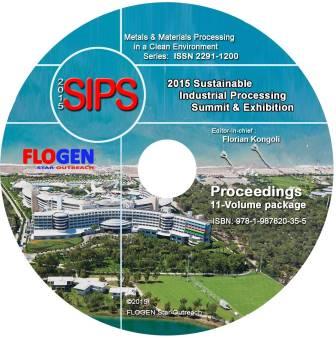2015-Sustainable Industrial Processing Summit
SIPS 2015 Volume 8: Composite & Ceramic, Quasi-crystals and Nanomaterials
| Editors: | Kongoli F, Pech-Canul M, Kalemtas A, Werheit H |
| Publisher: | Flogen Star OUTREACH |
| Publication Year: | 2015 |
| Pages: | 300 pages |
| ISBN: | 978-1-987820-31-7 |
| ISSN: | 2291-1227 (Metals and Materials Processing in a Clean Environment Series) |

< CD shopping page
Sustainable Development of Processes and Materials Using the Remodeled Central Paradigm of Materials Science and Engineering
Martin Pech-Canul1; Florian Kongoli2;1CINVESTAV-SALTILLO, Ramos Arizpe, Mexico; 2FLOGEN TECHNOLOGIES INC., Mont-Royal, Canada;
Type of Paper: Regular
Id Paper: 336
Topic: 18
Abstract:
In view of the worldwide increasingly growing budget restrictions and the profuse concerns on the environment, it is imperative to carry out the modification or development of new materials and/or processes in an optimized way by proper use of the modified central paradigm of materials science and engineering, proposed previously by the authors. On the basis of two previous publications on the subject, the authors suggest that positive results can be observed at massive or commercial scale, only if the sustainable development or modification of processes and/or materials starts at lab level, in the research centers or universities with a proper education strategy. The Modified Central Paradigm of Materials Science and Engineering - depicted by the relationship "Processing, Structure, Property, Performance, Reutilization/Recyclability" considers, from the outset, the sustainability, pollution, reutilization and recycling aspects. The modified paradigm implicitly embodies the environmental and economic aspects, emphasizing the saving in the use of energy, chemical reactants, water and consumables. It is also based in a synergistic approach that encourages scientists to work hand-in-hand with other researchers by using by-products or residues from other investigations or by offering the ones generated in the lab. This requires another essential feature; namely, the use of creativity and innovation that implicitly triggers competitiveness. In this contribution, specific action steps are proposed to work under the modified paradigm, particularly at laboratory level.